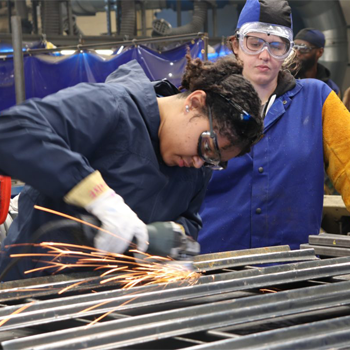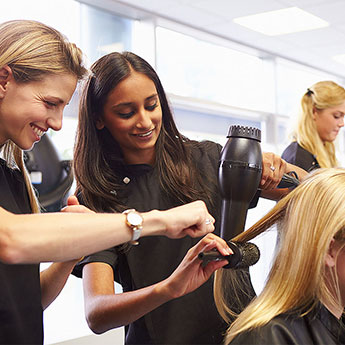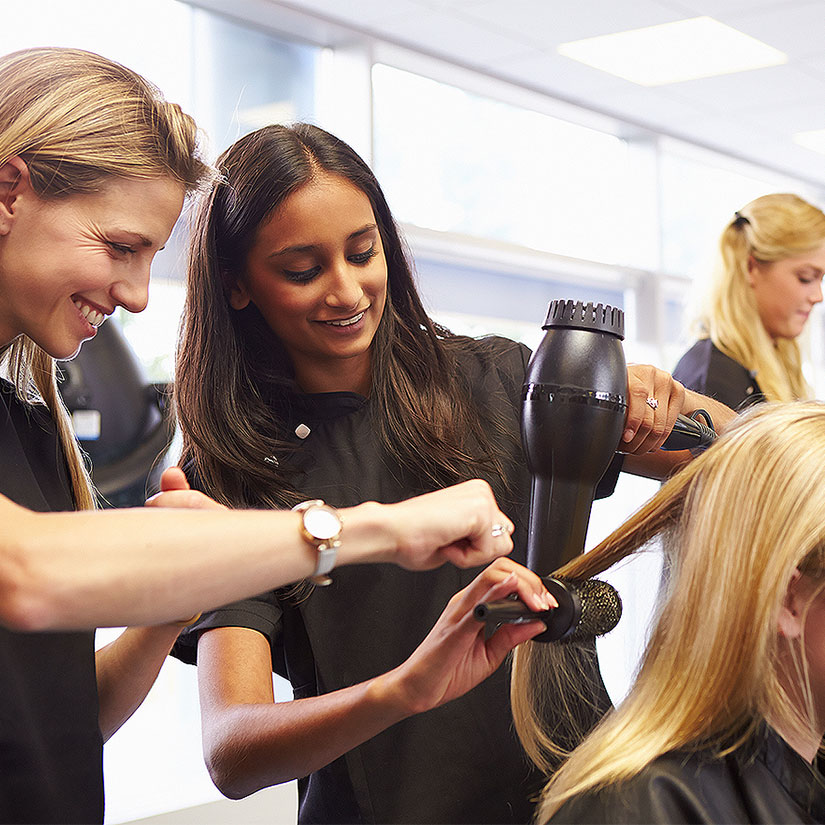Choosing the right education path can shape your future. More people—from recent high school graduates to adults seeking a career change—are rethinking the idea that a four-year college degree is the only route to success. Rising tuition costs, a shifting job market, and a renewed appreciation for skilled, hands-on work are fueling a movement toward trade schools. If you’re passionate about a particular trade or industry, a vocational program might fast-track you into a fulfilling career without the four-year wait.
Whether you’ve always been drawn to the beauty industry or you’re simply exploring alternatives to traditional academia, the first step is choosing an education path that fits your goals, lifestyle, interests, and values. So, how do you decide between trade school and a traditional college? In this guide, we’ll break down what each path looks like—from program length and cost to job prospects and return on investment—and explain why many people are turning to trade school programs (including those at Tricoci University) to turn their passion into a career faster.
What Is Trade School?
Trade school—also known as vocational or technical school—is a form of post-secondary education that focuses on teaching specific hands-on skills for a particular occupation. Instead of a broad curriculum with general education courses, trade school programs are streamlined to the practical training you’ll need for your chosen career. From cosmetology and esthetics to electrical work, automotive repair, culinary arts, construction, and beyond, these programs are designed for people who want to skip unrelated lectures and dive straight into learning a marketable skill.
One of the biggest differences between trade schools and traditional colleges is the timeframe. Unlike a traditional college program that often takes four or more years to culminate in a bachelor’s degree, most trade school programs can be completed in two years or less. In fact, some specialized certifications or diploma programs can take as little as a few months to finish, while more comprehensive trade programs might last 12 to 24 months, depending on the field. Because the focus is on skill-building (not just theory), trade school students spend a lot more time practicing in labs, clinics, or workshops and much less time in large lecture halls. By the time you graduate from a trade program, you’ll have tangible experience and often any required licenses or certifications—so you can feel confident and job-ready on day one of your new career.
At Tricoci University of Beauty Culture, our curriculum is built with real-world success in mind. With expert instructors and classes that emphasize hands-on training from day one, we help students build both the technical abilities and the confidence they need to thrive in beauty and wellness careers. That means you won’t be sitting through semesters of unrelated electives—you’ll be learning haircutting, skincare techniques, barbering, nail technology, and more right from the start, all tailored to prepare you for state licensing exams and the demands of the industry.
Trade School vs. College: Key Differences

When weighing trade school vs. college, several key differences stand out: time, cost, and how directly your education leads to a specific career. Understanding these factors can help you decide which path aligns best with your personal and professional goals.
- Program Length: A typical undergraduate college program (aimed at a bachelor’s degree) takes about four years of full-time study—and even longer if you pursue graduate or professional degrees. During that time, students often complete a wide range of general education courses alongside their major. In contrast, trade school programs are much shorter. Many trade certificates and diplomas take less than two years, and some can be completed in under a year. This means trade school graduates can enter the workforce and start earning years earlier than many college graduates.
- Cost & Tuition: Tuition is a major factor for most students. Four-year colleges (especially private universities) can be expensive, often requiring tens of thousands of dollars per year in tuition, fees, and housing. Over four years, that adds up quickly (potentially well over $100,000 total). Trade schools, on the other hand, tend to be much more affordable. The investment is typically lower—and the payoff can come quicker—than a traditional degree. Trade school students also often avoid the hefty student loan debt that plagues many four-year college graduates. It’s worth noting that financial aid is usually available for accredited trade schools, so you can apply for scholarships, grants, and federal student loans just as you would for a college.
- Curriculum & Training Style: Traditional colleges offer a broad academic experience, which can include classes in literature, history, math, and science—even if those subjects aren’t directly related to your major. This broad education can be enriching and help build critical thinking, but it may not translate into specific job skills. Trade schools, by contrast, cut right to the chase. The coursework is focused directly on the trade or technical skills you need for your chosen career. Many people find this practical, hands-on approach more engaging because you’re learning by doing. By graduation, a trade school student has typically completed plenty of real-world practice (often through clinics, workshops, or apprenticeship-style training), whereas a college student may have little on-the-job experience until they seek internships or post-grad employment.
- Career Focus and Outcomes: Trade school is inherently career-oriented—the goal is to prepare you for a particular job (electrician, cosmetologist, medical assistant, etc.) and get you into that job quickly. In a trade program, your “major” is your career training. Traditional college can open doors to a wider range of fields, but the path from degree to career is often less direct. If you know exactly what you want to do and it’s a skilled trade, trade school can be a more straightforward route into that field. On the flip side, if you want a broad education or are unsure about your career and want time to explore different subjects, a college environment might provide more flexibility.
In recent years, many members of Gen Z have chosen trades over four-year degrees—a trend dubbed the “Toolbelt Generation.” Skilled trades are in high demand, offering job security and competitive pay. Plus, as automation reshapes the job market, hands-on careers remain resistant to outsourcing and AI replacement. When you factor in lower tuition and faster entry into the workforce, the return on investment for a trade education can be extremely high. Trade school graduates often start earning sooner, gain valuable experience, and avoid significant student debt—all of which contribute to a compelling financial outcome.
Trade School vs. College: Pros and Cons

No one-size-fits-all answer exists for choosing education and plotting a career path. Both trade schools and traditional colleges have their own advantages and drawbacks. Here’s a side-by-side look:
Trade School Pros
- Shorter programs—complete in 6 to 24 months and enter the workforce sooner.
- Lower cost—tuition is often much less than a four-year college, reducing student debt.
- Job-ready training—curriculum focused on exact skills needed for your chosen career.
- Hands-on experience—extensive practice in real-world settings.
- Entrepreneurial potential—in many trades, you can freelance or open your own business soon after graduation.
Trade School Cons
- Narrower academic scope—less exploration of unrelated subjects.
- Limited credit transfer—credits may not apply toward a later college degree.
- Perceived prestige gap—some people still undervalue trade careers (though that’s changing).
College Pros
- Broader education—exposure to diverse subjects beyond your major.
- Path to advanced degrees—required for many professional careers (law, medicine, academia).
- Standardized credits—easier to transfer or pursue further education.
- Higher earnings in certain fields—essential for professions like engineering or finance.
College Cons
- Higher cost—tuition, fees, and living expenses can be substantial.
- Longer time to graduate—typically four years or more.
- Less hands-on training—theory-heavy curricula may require internships for real-world experience.
- Delayed entry into the job market—graduates often start careers in their mid-20s.
- Uncertain ROI—not all degrees guarantee high-paying jobs; some graduates struggle with debt.
Examples of Trade School Programs
Trade schools serve a wide array of industries:
- Beauty & Wellness: Careers in cosmetology, barbering, esthetics, and nail technology blend creativity with technical skill. Learn more in our cosmetology program.
- Culinary Arts & Hospitality: From chef training to hotel management, these programs prepare you for food service and hospitality careers.
- Skilled Trades (Construction & Industrial): Electricians, plumbers, welders, and HVAC technicians are in high demand.
- Healthcare & Technical Services: Medical assisting, dental hygiene, and phlebotomy programs equip you for patient-care roles in clinics and hospitals.
At Tricoci University, we specialize in beauty and wellness education but share the mission of trade-focused institutions everywhere: to equip students with skills that translate directly into in-demand careers.
Explore Tricoci’s Programs

If you’re interested in a career in beauty, Tricoci University of Beauty Culture offers a range of focused trade school programs designed to jump-start your journey. Our programs combine creative curriculum, technical training, real-world experience, and business fundamentals to set you up for long-term success in the beauty industry.
- Cosmetology
Learn haircutting, coloring, styling, texture services, and salon management to prepare for your state licensing exam and start your career in top salons. - Esthetics
Master facials, skincare treatments, makeup application, and advanced therapies, alongside client consultation and spa business skills. - Barber
Train in precision cutting, hot shaves, beard grooming, and shop management—honoring tradition while preparing you for today’s barbering industry. - Nail Technology
Practice manicures, pedicures, nail enhancements, and art techniques, with an emphasis on sanitation, nail health, and client service.
Frequently Asked Questions
What is trade school?
Trade school is a career-focused institution offering hands-on training for specific occupations—skipping broad general education courses to dive right into vocational skills.
Is trade school cheaper than college?
Generally, yes.
How long do trade school programs take?
Most trade programs take 6 to 24 months. Some certifications can be earned in just a few months, compared to four years for a bachelor’s degree.
Can trade school students get financial aid?
Yes. Accredited trade schools qualify for federal financial aid (FAFSA), including grants, loans, and scholarships—just like traditional colleges.
Is Tricoci University the Right Fit for You?
Choosing between trade school and college comes down to your personal goals, finances, and learning style. If you’re excited by a creative, hands-on career in beauty, and you value a supportive, skill-focused environment, Tricoci University could be the perfect fit. We’ve been a leader in beauty education for over 20 years, and our programs are designed to prepare you for a real career, not just an exam.
With campuses across Illinois, Indiana, and Wisconsin—and flexible scheduling options—you can balance your education with work or family commitments. Our admissions and financial aid teams will guide you through enrollment, scholarship applications, and payment plans.
Ready to see what’s possible?
Take the first step toward your dream beauty career today. Tricoci University is here to help you turn your passion into a profession!
For more insights on planning your education and career after high school, explore our related guide on What to Do After High School.





